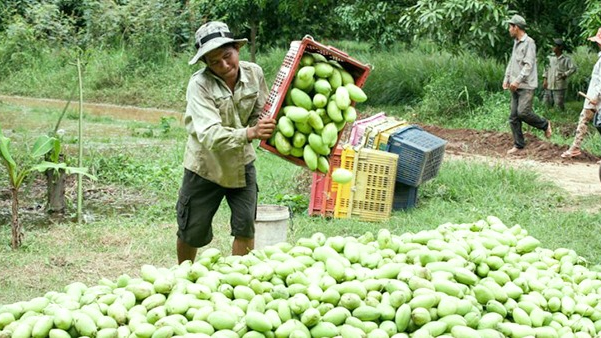Introduction of Mango Production
Mango is one of the most common fruits in many continents, especially in Asia, Central and South America and Africa. World mango production is concentrated mainly in Asia and specifically in India, which produces about 15 million t (MT) per year.
Mangoes are now grown in 100 countries with more than 65 countries each producing more than 1,000 MT per year. The total production of mangoes in the world is about 40 MT, which is an important part of the life of many people, not only as a source of nutrition, but also as a source for millions of people under the heat.
Consumers did not know about non-tropical mangoes until the 1960s and there were almost no markets in the fresh fruit. In recent years, mango has been well established as a fresh fruit and produce in the world market. Demand for mangoes worldwide is seen to be increasing, especially in tropical countries where mangoes are rapidly gaining popularity.
The main importing country is the United States and in the EU it is the Netherlands, France, England, Portugal, Spain, Belgium, Denmark and Sweden. Apart from India, other mango producers are China, Mexico, Thailand, Indonesia, Pakistan, Philippines, Nigeria, Brazil, Peru, Australia, South Africa, Malaysia and Venezuela.
The main marketing season of IndiaRSQUO starts from April to July, while harvesting continues for 8-10 months every year in Brazil, Colombia, Kenya and Venezuela. This period is also longer in Burkina Faso, Costa Rica, Indonesia, Jamaica, Mexico, Nicaragua and Puerto Rico. There are many varieties of mango grown in different countries; India alone has nearly 1,300 varieties of mango (20 are commercially grown) and Thailand has about 100 varieties. This article has discussed the current situation of mango production and its future.
Mango producing Countries


India
The largest Mango producing country in the world is India. Production there amounts to more than 18 million tons, or about 50% of the world’s supply of mangoes. The leading mango producing states in India are Andhra Pradesh, Bihar, Gujarat, Karnataka, Maharashtra and Orissa, although many other Indian states grow mangoes. In total, India has about 2,309,000 acres dedicated to mango cultivation.
China
The second largest producer of mangoes is China with 4.77 million tons of mangoes. These figures include mangoes produced in Taiwan. Significant commercial production began here in the 1960s, although mangoes have been cultivated in China for centuries. Many mango plants are found in the southern region, where the temperature is hot. Importers of mangoes from China are Russia, Japan and South Korea.
Thailand
Thailand is the third largest producer of mangoes in the world, producing 3.4 million tons in 2016. Thailand has about 753,671 acres dedicated to mango production. Thailand processes and exports this fruit, including the following presentations: fresh, frozen, canned and dried. However, many fresh mangoes are sold in domestic markets. Only about 2% of fresh fruit is exported to South Korea, China, Japan, Malaysia and Singapore. The value of the mango is over $50 million
Areas of production:
Mangoes are grown commercially in Andhra Pradesh, West Bengal, Karnataka, Kerala, Bihar, Uttar Pradesh, Uttara Khand, Punjab and Haryana, Maharashtra and Gujarat. Mangoes are grown in an area of 2,309,000 hectares with an annual production of 12,750,000 metric tons. India produces good quality mangoes; Alphonso is very popular in western countries.
In Punjab, mangoes are grown in the submontane belt which includes the districts of Gurdaspur, Hoshiarpur Roop Nagar, Fatehgarh Sahib, Mohali and Patiala. Today, its cultivation has spread to the arid areas irrigated by canals in northern India.
Sorting of mango varieties in India
Alphonso, Totapuri, Kesar are the best processed mango varieties in India. Sindura, Raspuri and Neelam are arranged in smaller sizes. Southern and western styles are used for planning. The northern varieties are mostly used for table purposes Totapuri and Alphonso mango are well processed varieties contributing 90% processing.
Totapuri contributes about 76% of the turnover and Alphonso 14%. The remaining market shares are mangoes of Kesar, Sindhura and Neelam varieties. This variety is highly sought after in the domestic and international markets. India’s peak mango season runs from April to July. Mango processing continues in May-July.
Benefits of eating mangoes
Mango is full of antioxidants, minerals, vitamins and enzymes.
Many minerals are also found in mango; some of them are phosphorus, copper, calcium and magnesium. These minerals make our body healthy and provide energy to fight various diseases.
It contains vitamins A, B, C and E, so it is very useful for our health. Mango is a good source of energy, its consumption in the summer makes your body cool, and the risk of heatstroke is reduced.
Eating mango is very beneficial for patients with high blood pressure. Because it has a lot of potassium and magnesium, which controls the amount of sodium that circulates in the body through the blood.

